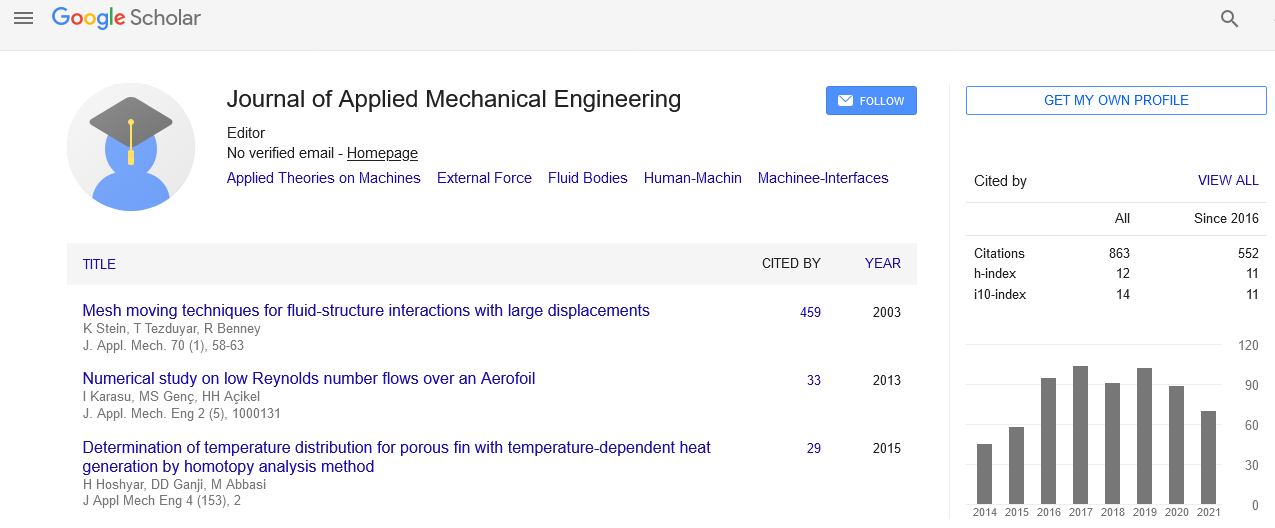Indexed In
- Genamics JournalSeek
- JournalTOCs
- CiteFactor
- RefSeek
- Hamdard University
- EBSCO A-Z
- OCLC- WorldCat
- Publons
- Google Scholar
Useful Links
Share This Page
Journal Flyer

Open Access Journals
- Agri and Aquaculture
- Biochemistry
- Bioinformatics & Systems Biology
- Business & Management
- Chemistry
- Clinical Sciences
- Engineering
- Food & Nutrition
- General Science
- Genetics & Molecular Biology
- Immunology & Microbiology
- Medical Sciences
- Neuroscience & Psychology
- Nursing & Health Care
- Pharmaceutical Sciences
Opinion Article - (2022) Volume 11, Issue 8
Frictionless Compressor and its Mechanical Components
Selvan Raghu*Received: 18-Jul-2022, Manuscript No. JAME-22-18031; Editor assigned: 21-Jul-2022, Pre QC No. JAME-22-18031 (PQ); Reviewed: 09-Aug-2022, QC No. JAME-22-18031; Revised: 19-Aug-2022, Manuscript No. JAME-22-18031 (R); Published: 26-Aug-2022, DOI: 10.35248/2168-9873.22.11.434
Description
Traditional centrifugal compressors use roller bearings and hydrodynamic bearings, which both require power and an oil and lubrication system. This can be avoided by introducing modern compressor technology known as frictionless compressor technology. Frictionless compressor technology is a compressor that uses magnetic bearings and a permanent magnet synchronous motor. Magnetic bearings are utilized in frictionless compressors instead of roller bearings and hydrodynamic bearings. Magnetic bearings use less energy and do not require oil or lubrication systems. A brushless synchronous motor with permanent magnets replaces copper windings. This compressor offers great reliability, efficiency, and low maintenance and staff costs. The use of a digital control system makes regulating and monitoring activities relatively simple. Frictionless compressor technology ushers in new eras of air conditioning, refrigeration, and other industries. Frictionless Compressor Technology is a rapidly developing engineering technology.
High-speed, two-stage centrifugal compression with inbuilt variable-speed drive is now bringing compressors to mainstream middle-market applications. As the condensing temperature and heat load decrease, the compressor speed decreases, optimizing energy performance across the full working range from 100% to 20% or less of rated capacity. An optional, digitally controlled load balancing valve allows for operations at near-zero loads. Centrifugal compressors are more efficient than screw or scroll compressors and make better use of speed control, but they are often only available in bigger quantities. They are able to take advantage of centrifugal compressor technology at a smaller size than is generally available by using the smaller shaft.
Mechanical Components
Magnetic bearings and bearing sensors
It is made up of both permanent and electromagnets. It allows for precise control of frictionless compressor shaft spinning on a magnetic cushion. Bearing sensors, which are positioned at each magnetic bearing, provide real-time feedback to bearing control on rotor orbit and thrust/axial information.
Permanent-magnet synchronous motor
When the compressor is not turned on, carbon-lined radially and axially placed bearings sustain the rotor. It keeps the rotor from making touch with other metallic surfaces.
Shaft and impellers
There is only one significant moving compressor component and it serves as the rotor for a permanent-magnet synchronous motor. The impellers are keyed directly to the motor rotor.
Magnetic-bearing technology
Magnetic-bearing technology is very different. Traditional lubricated bearings are replaced by a digitally controlled magnetic-bearing system comprised of both permanent magnets and electromagnets. The only moving component of the compressor is the frictionless compressor shaft. It revolves on a magnetic cushion that is levitated. Two radial and one axial magnetic bearing keep the shaft in place. The motor and impellers, which are keyed directly to the magnetic shaft, levitate when the magnetic bearings are powered. Permanent magnetic bearings do the bulk of the job, while digitally controlled electromagnets do the fine tuning.
As the levitated assembly drifts away from the center point, the intensity of the electromagnets is modified to rectify the position. These modifications take place 6 million times every minute. The software is programmed to correct for any out-ofbalance state in the levitated assembly. Front and rear electromagnetic cushions hold the rotor shaft in place. For correct shaft repositioning, ten sensors transmit a signal to a digital controller, which then delivers a command to the five independent Pulse Width Modulators (PWM).
Conclusion
This compressor provides excellent reliability, efficiency, and low maintenance and staff costs. The use of a digital control system makes regulating and monitoring activities relatively simple. Frictionless compressor technology ushers in new eras of air conditioning, refrigeration, and other industries. There is no need for an oil management system with this frictionless magnetic bearing design. Furthermore, because there is no oil to coat the heat transfer surfaces, the unit's high efficiency may be maintained over the product's lifespan. The compressor's remarkable efficiency allows equipment makers to offer the highest efficiency/lowest emissions, cost effective performance in its tonnage range.
Citation: Raghu S (2022) Frictionless Compressor and its Mechanical Components. J Appl Mech Eng. 11:434.
Copyright: © 2022 Raghu S. This is an open-access article distributed under the terms of the Creative Commons Attribution License, which permits unrestricted use, distribution, and reproduction in any medium, provided the original author and source are credited.

